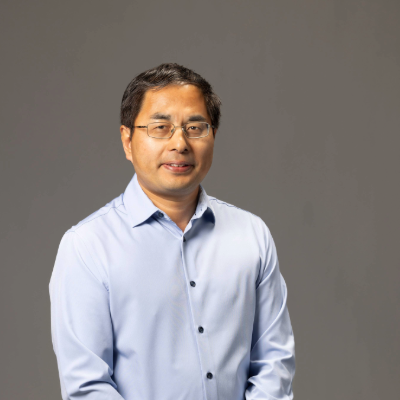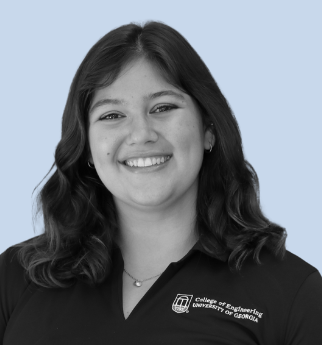Every year since 1979, the University of Georgia Research Foundation has spotlighted UGA faculty and graduate students for outstanding research and creative achievement. To learn more about the awards, visit the UGA Research website.
We’re proud to see several familiar names on the list:
Lamar Dodd Creative Research Award 2025

WenZhan Song, Georgia Power Mickey A. Brown Professor in the College of Engineering, is a leading researcher in sensor networks, cyber-physical systems, and security. His work integrates artificial intelligence and the Internet of Things (IoT) to enhance infrastructure security, energy resilience, and healthcare technologies. Song has pioneered breakthrough IoT innovations that enable real-time, non-intrusive health and activity monitoring for humans, animals, machines, and infrastructures. His research in cyber-physical security has led to advanced systems that fuse cyber and physical signals to detect and mitigate threats to smart grids and industrial systems. He has also developed zero-trust IoT data infrastructure to ensure secure, reliable, and privacy-preserving data storage and sharing. Many of his smart IoT technologies have been adopted in real-world settings. As director of UGA’s Center for Cyber-Physical Systems, Song leads interdisciplinary initiatives that drive innovation and industry partnerships. His contributions have earned him numerous accolades, including the IEEE Mark Weiser Award.
Creative Research Medal 2025

Krista Capps, associate professor in the Odum School of Ecology and the Savannah River Ecology Laboratory, has led groundbreaking research on global carbon cycling in rivers. As part of a landmark study published in Science, Capps and colleagues conducted an experiment across 514 streams on six continents to measure organic matter decomposition. The team used a standardized assay to assess microbial activity, generating the first global-scale model of riverine carbon breakdown and identifying key environmental drivers. This research showed that accelerated decomposition rates were linked to regions dominated by human activities, such as urbanization and agriculture, potentially altering aquatic food webs and increasing carbon release into the atmosphere. Capps and co-authors used machine learning to develop a model explaining 70% of the variance in prior decomposition rates and created a predictive tool for environmental forecasting. A recipient of the NSF CAREER Award, she continues to advance freshwater ecology with globally impactful research on ecosystem resilience.
Fred C. Davison Early Career Scholar Award 2025

Matthew Bilskie, assistant professor in the College of Engineering, is advancing the field of coastal resilience through innovative modeling of storm surge, flood risk, and nature-based infrastructure. As head of the college’s Coastal Ocean Analysis and Simulation Team and an affiliate of the Institute for Resilient Infrastructure Systems, he develops high-resolution hydrodynamic models that inform risk reduction strategies for vulnerable coastal communities. Bilskie’s research integrates engineering, computer science, and natural resource economics, providing critical insights into how tidal dynamics, sea-level rise, and climate change impact coastal flooding. His collaborations with the U.S. Marine Corps, the National Oceanic and Atmospheric Administration, and the U.S. Army Corps of Engineers have led to real-world applications, including flood mitigation planning for military installations. With over $32 million in research funding, 53 peer-reviewed publications, and leadership in interdisciplinary resilience efforts, Bilskie is at the forefront of shaping coastal adaptation strategies. His work continues to influence both policy and engineering solutions for climate resilience.
Research Communications Award 2025

Jenna Jambeck, Georgia Athletic Association Distinguished Professor of Environmental Engineering in the College of Engineering, is a globally recognized researcher and communicator specializing in plastic pollution and materials management. Her unique ability to blend scientific rigor with effective communication has elevated public understanding and policy action on environmental sustainability worldwide. Jambeck’s groundbreaking studies, including the 2015 revelation that 8 million metric tons of plastic waste enter the Earth’s oceans annually, have been extensively covered by major outlets such as NPR, BBC, The New York Times, and National Geographic. Her publications have been cited over 37,000 times, ranking among the top in their fields, and her work has been instrumental in United Nations treaty negotiations, global policy workshops, and the creation of circular economy frameworks through her Circularity Assessment Protocol. As the creator of the Marine Debris Tracker app, Jambeck has facilitated global citizen science efforts, leading to extensive data collection in 100 countries.

Matt Chambers, Excellence in Graduate Student Research Award for the School of Environmental, Civil, Agricultural, & Mechanical Engineering
The Excellence in Graduate Research Award for the School of Environmental, Civil, Agricultural, & Mechanical Engineering recognizes graduate students for the quality of their research as demonstrated by student success in the publication of their work in prestigious, highly cited international journals.

Katie Kahn, Merit Award for Service
The College of Engineering Undergraduate Merit Awards for Service, Research, and Athletics honor students who demonstrate a strong work ethic inside and outside the classroom. These students exceed expectations as set forth by instructors, professors, and staff.


